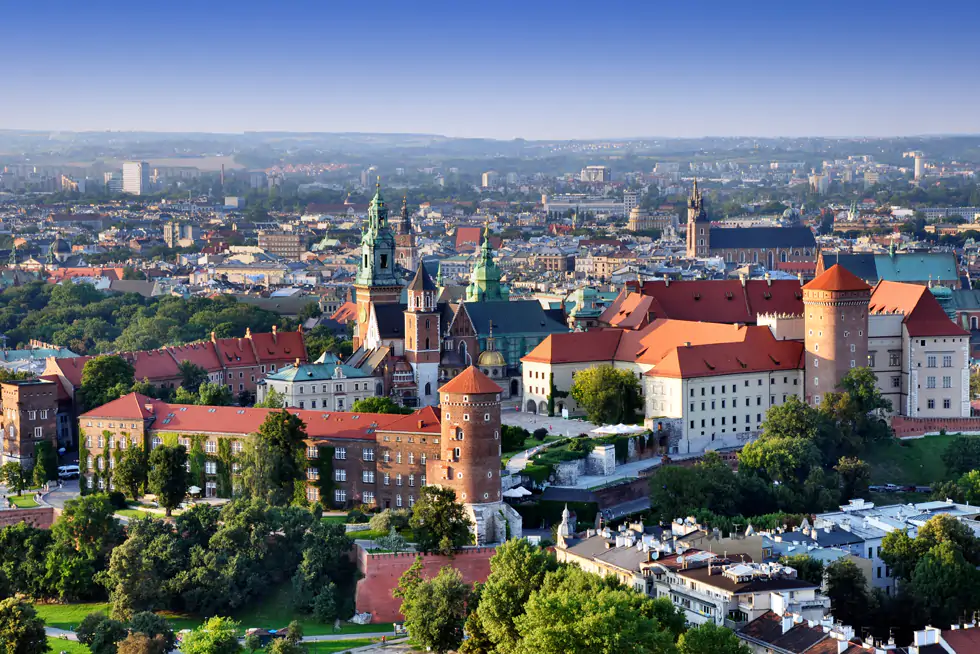Thirty-six Johns Hopkins students will convene in Krakow, Poland, to explore the region through historical, literary, scientific, and social lenses during an immersive writing residency in June 2025.

MA in Writing program lecturer Michael Downs facilitated the residency’s logistics such as scheduled lectures by Polish experts, historians, and writers and a visit to Auschwitz, the former Nazi concentration and extermination camp.
“Michael has been absolutely instrumental in the planning, which has been a year in the works,” said MA in Writing program director Karen Houppert who is leading the residency course Literature Against the Autocracy. “He happened to be in Poland when Russia invaded Ukraine, and immigrants were flooding over the border. He has a lot of great connections and knows the literary community there well.”
The 20 MA in Writing students will have completed seven books and other assigned reading from Eastern European writers in advance of their arrival in Krakow. Their stay begins with a literary bicycle tour throughout the city, including a stop at the factory made famous in the film Schindler’s List. They will attend lectures and discussions at Jagiellonian University, participate in writing exercises, and venture to an author’s series in the evenings where local authors will share their work.
“This is our first dive into Eastern European literature, which is critical to our understanding of global literature,” Houppert said. “For us, the residencies that we have every summer are really impactful. Establishing a sense of place is always important for a writer. These trips are an opportunity for students to dig deeply into a particular culture and region and see how its history and community have influenced them. To be immersed in the place while you are studying these writers is a powerful experience for students. Exposing them to a timely topic, which examines the rise of dictatorships across the world, allows them to look at how Eastern European writers fought back in ways that are not necessarily didactic or agitprop, but rather very subtle, artful push backs against autocracy.”
MA in Science Writing Program Coordinator Sam Apple will be leading 16 students through the course Science and Global Conflict, exposing students to the global conflicts in the region through the lens of science. This journey will begin with Cold War science, looking at the history of the bomb and how it affected the politics of the region; then move through the decades to examine modern warfare trends. With an emphasis on the human consequences of war, students will be interviewing a 96-year-old Holocaust survivor and Ukrainian refugees. They have also arranged meetings with war reporters who have been at the frontline covering the Russian-Ukrainian War and other conflicts and will attend lectures by Polish academics and a NATO expert on the history and politics behind the region’s geopolitical military strategy.
Additionally, students will receive a personalized tour through the Nowa Huta neighborhood of Krakow, an idealized socialist community developed during Soviet occupation.
“There is really no substitute for being there in person and talking to locals, refugees, writers, and scientists from the region,” Apple said. “There is nothing like seeing the region with your own eyes and relating to people who have lived the history. Our program is largely remote so when we have these opportunities to be together in person, we really want to take advantage of that and make it a powerful, memorable experience.”
The MA in Writing students will culminate their experience abroad with a creative writing project expounding on a place, theme, or craft elements of the writers they examined in Poland. Science Writing students will be preparing “As Told To” stories, shaping narratives of the refugees they interviewed for a collection of articles.
“It should be a really interesting week that allows students, across disciplines, to fully immerse themselves in the life of a writer,” Houppert said. “It is an invaluable opportunity for students to make connections, to sit in the classroom across from faculty members and have those intense and fruitful conversations, but also to have those conversations carry on outside the classroom. It provides a critical and necessary space for honing your craft while creating a sense of community and networking.”